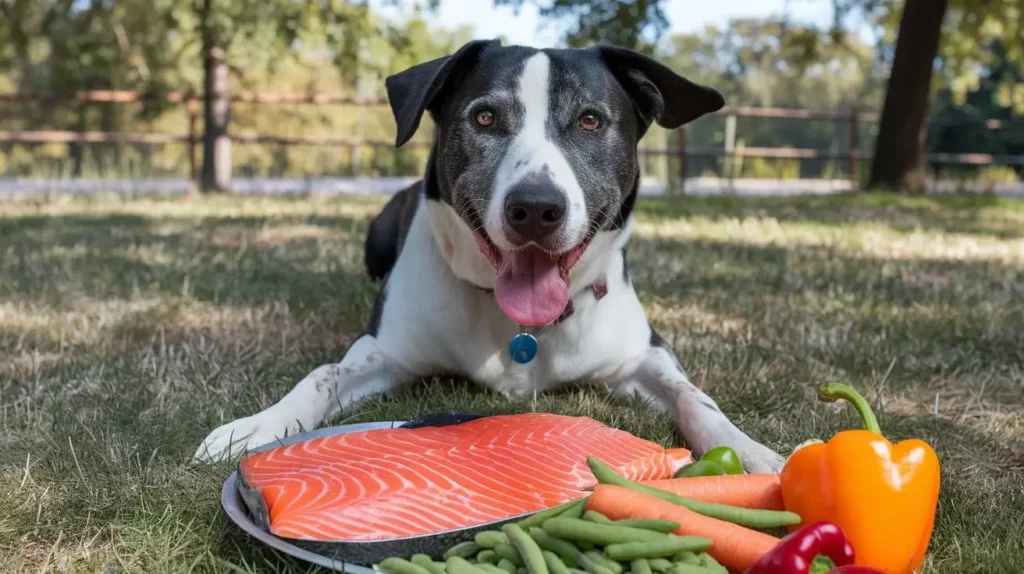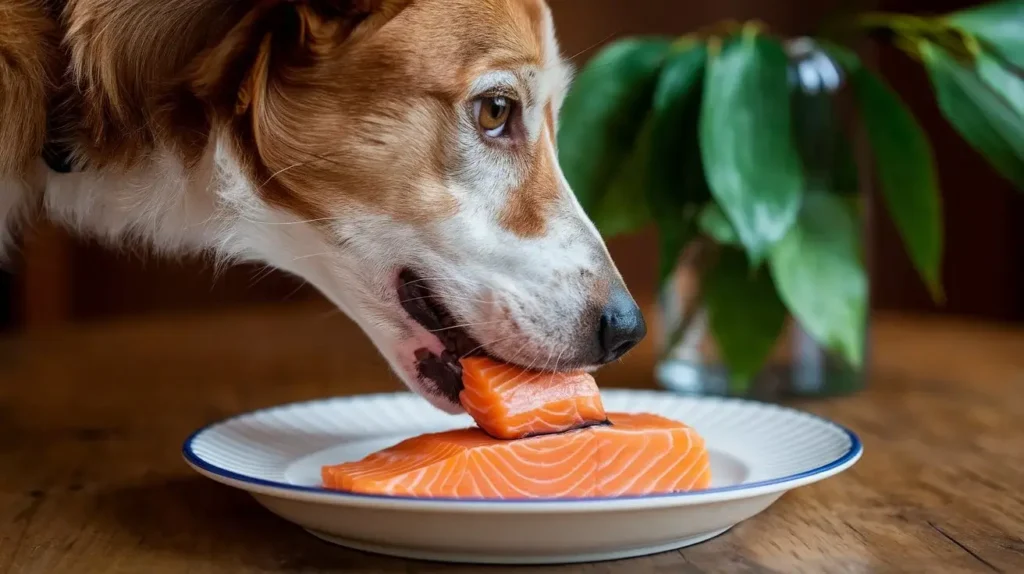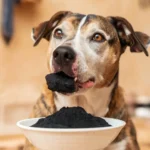Introduction: The Nutritional Value of Salmon for Canines
Is salmon healthy for dogs? This question has undoubtedly been swimming through the minds of pet owners for years. As we dive into the depths of canine nutrition, we’ll thoroughly explore the benefits and potential risks of feeding salmon to our furry friends. Moreover, we’ll cover all angles, from canned salmon to raw fish, to help you make an informed decision about including this nutrient-rich fish in your dog’s diet.
The Nutritional Profile of Salmon: A Powerhouse for Pups
Before we address whether salmon is healthy for dogs, let’s first examine its impressive nutritional content. Salmon is widely renowned for its high-quality protein, omega-3 fatty acids, essential vitamins (B12, D), and minerals (selenium, potassium). These nutrients, in fact, play crucial roles in maintaining your dog’s overall health. However, you might wonder how they specifically benefit our canine companions.
Health Benefits: Why Salmon Can Be a Superfood for Dogs
Omega-3 Fatty Acids: The Heart of the Matter
It is, without a doubt, one of the reasons why salmon is considered healthy to feed dogs with its highly concentrated omega-3 fatty acids. These essential fatty acids offer a wide range of benefits: healthier skin and coats, reduced inflammation, sharpened cognitive functions, and help with joint health. Remember that much like humans, your dog cannot create omega-3 on their own, which makes dieting very important in introducing these substances.
Protein: Building Blocks for Canine Health
In addition to omega-3s, salmon provides high-quality protein, supporting muscle development and maintenance, immune function, repair of tissues, and healthy skin and coat. In addition, its digestibility makes it an excellent food for sensitive stomachs.
Vitamins and Minerals: Micronutrients with Macro Impact
You might ask, “Is salmon healthy for dogs when it comes to micronutrients?” Absolutely! The vitamins and minerals in salmon significantly contribute to bone health (vitamin D), energy production (B vitamins), antioxidant protection (selenium), and electrolyte balance (potassium). These micronutrients work synergistically to support your dog’s overall health and vitality.
Is Canned Salmon Healthy for Dogs?
Many pet owners often ponder, “Is canned salmon healthy for dogs?” The short answer is yes, However, there are definitely some important factors to take into account. Canned salmon can be a convenient and nutritious option, provided you choose the right type. The benefits include convenience, long shelf life, soft texture ideal for senior dogs, and often includes edible bones providing calcium. However, when selecting canned salmon, it’s crucial to choose varieties packed in water (not oil), opt for low-sodium or no-salt-added options, and avoid those with added spices or flavorings. When fed in moderation, canned salmon can indeed be a healthy addition to your dog’s diet, offering many of the same benefits as fresh salmon.

Is Salmon Skin Healthy for Dogs?
Another frequent inquiry that comes up is, “Is salmon skin healthy for dogs?” The answer is generally yes, Yet, there are several key aspects to remember. Salmon skin is rich in omega-3 fatty acids, provides additional protein, and can be a tasty treat for dogs. Nevertheless, there are precautions to take when feeding salmon skin to your canine companion. Firstly, always remove any scales before feeding. Secondly, ensure the skin is fully cooked. Lastly, feed in moderation due to its high fat content. While salmon skin can be healthy for dogs, it should, however, be given as an occasional treat rather than a regular part of their diet.
Is Cooked Salmon Healthy for Dogs?
When it comes to serving salmon to your canine companion, cooked salmon is often the safest and healthiest option. But you might still wonder, is cooked salmon healthy for dogs in all its forms? Cooked salmon offers several benefits, including a reduced risk of parasites compared to raw salmon, easier digestibility, and retention of most of its nutritional value. The best cooking methods for dog-friendly salmon include baking, grilling (without seasoning), and poaching. When preparing salmon for your dog, it’s crucial to avoid using oils, butter, or seasonings that may be harmful to canines.
Is Raw Salmon Healthy for Dogs?
The question “Is raw salmon healthy for dogs?” is more complex and controversial. While some pet owners advocate for raw diets, feeding raw salmon to dogs comes with significant risks that should not be overlooked. Although raw salmon may preserve heat-sensitive nutrients and contain natural enzymes that aid digestion, the risks far outweigh these potential benefits. The dangers associated with raw salmon include Salmon Poisoning Disease (SPD), bacterial contamination (e.g., Salmonella, Listeria), and choking hazards from bones. Due to these risks, most veterinarians and pet nutrition experts strongly advise against feeding raw salmon to dogs.
How to Safely Introduce Salmon to Your Dog’s Diet
If you’ve determined that salmon is indeed healthy for your dog, here’s how to safely incorporate it into their diet. First, start with small amounts to test for allergies or sensitivities. Then, gradually increase the portion size while monitoring your dog closely for any adverse reactions. Additionally, it’s essential to consult with your veterinarian about appropriate serving sizes. Remember, while salmon can be healthy for dogs, it should be part of a balanced diet and not the sole protein source.

Potential Risks and Concerns: When Salmon Isn’t So Healthy for Dogs
Despite its many benefits, there are situations where salmon may not be healthy for dogs. Some dogs may be allergic to fish, and large fish like salmon can accumulate mercury. Moreover, overfeeding can lead to weight gain, and certain seasonings and preparations (such as garlic, onions, and excessive salt) are harmful to dogs. Therefore, it’s always best to consult with your veterinarian before making significant changes to your dog’s diet.
Alternatives to Salmon: Other Fish Options for Dogs
If you’re concerned about feeding salmon to your dog, consider these alternatives: sardines, whitefish, tilapia, and cod. These fish offer similar nutritional benefits and may be more suitable for some dogs.
Frequently Asked Questions: Is Salmon Healthy for Dogs?
1. Can dogs eat salmon?
Yes, dogs can eat cooked, boneless salmon. It provides essential nutrients and offers many health benefits when prepared correctly.
2. What are the health benefits of salmon for dogs?
Salmon contains omega-3 fatty acids, which support healthy skin, a shiny coat, reduce inflammation, and promote joint health. It also provides high-quality protein and vitamins like B12 and D, crucial for overall canine well-being.
3. Should I feed raw salmon to my dog?
No, avoid giving raw salmon to dogs. Raw salmon can carry parasites like Neorickettsia helminthoeca, which causes salmon poisoning disease. Always cook salmon thoroughly to eliminate any harmful bacteria or parasites.
4. How should I prepare salmon for my dog?
Cook salmon fully and remove all bones. Use methods like steaming, baking, or grilling without adding oil or seasonings, especially garlic or onions, which can harm dogs.
5. Can dogs eat salmon skin?
Yes, dogs can enjoy salmon skin in moderation. The skin contains healthy fats, but make sure to cook it well and avoid adding any seasonings or oils, which can upset a dog’s stomach.
6. How much salmon should I give my dog?
Feed salmon as an occasional treat or supplement to your dog’s regular diet. Limit servings to once a week, adjusting the portion size based on your dog’s size. Small dogs should get a few bites, while larger dogs can handle more.
Expert Opinions: What Veterinarians Say About Salmon for Dogs
Let us hear from the professionals in veterinary medicine on the advice over feeding salmon to dogs. Most agree that salmon is a healthy addition to the diet of a dog, when fed properly. They advance serving sizes according to weight and activity-usually an advocacy of cooked salmon as the safest option. For dogs with specific health conditions, always consult your vet before introducing salmon or any new food.

Conclusion: Balancing the Benefits and Risks of Salmon for Dogs
In conclusion, salmon can indeed be healthy for dogs when fed properly. Its rich nutritional profile offers numerous benefits, from promoting a shiny coat to supporting heart health. However, it’s crucial to consider the potential risks and prepare salmon safely for your canine companion. Whether you choose canned salmon, cooked fillets, or even the occasional piece of skin, moderation is key. Always consult with your veterinarian to ensure that salmon is an appropriate addition to your dog’s diet, especially if they have pre-existing health conditions. By understanding the nuances of feeding salmon to dogs, you can make informed decisions that contribute to your furry friend’s health and happiness. Keep in mind that each dog is distinct, and a solution that is effective for one might not be appropriate for another. With careful consideration and proper preparation, salmon can be a delicious and nutritious part of your dog’s meal plan.








